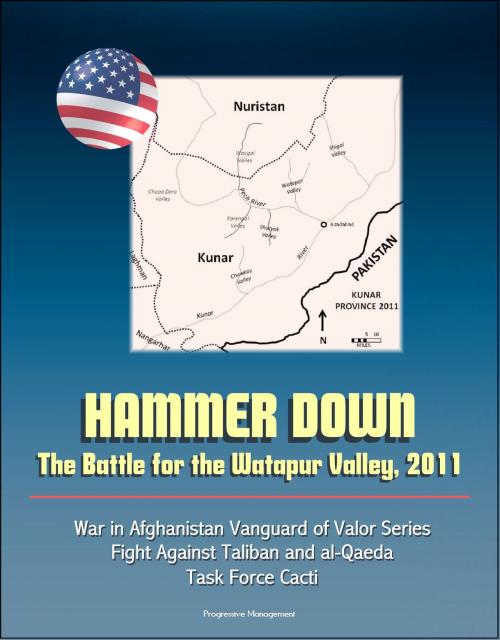Hammer Down: The Battle for the Watapur Valley, 2011 - War in Afghanistan Vanguard of Valor Series, Fight Against Taliban and al-Qaeda, Task Force Cacti
Nonfiction, History, Military| Author: | Progressive Management | ISBN: | 9781311988607 |
| Publisher: | Progressive Management | Publication: | February 22, 2015 |
| Imprint: | Smashwords Edition | Language: | English |
| Author: | Progressive Management |
| ISBN: | 9781311988607 |
| Publisher: | Progressive Management |
| Publication: | February 22, 2015 |
| Imprint: | Smashwords Edition |
| Language: | English |
With this third installment of the Vanguard of Valor series, the Combat Studies Institute transitions from the anthology format of the previous two volumes to one that focuses on the actions of a single unit and operation. HAMMER DOWN is the story of a tactical operation conducted by the Soldiers of 2d Battalion, 35th Infantry Regiment, of the 3d Brigade Combat Team of the 25th Infantry Division, in partnership with units of the Afghan National Security Forces (ANSF). Known as Task Force Cacti, this unit's experience in the Watapur Valley of Nuristan Province in June 2011 well illustrates the challenges of combat in the mountains of Regional Command-East, where the terrain was a constant and at times a more formidable enemy than the Taliban, HiG, or al Qaeda fighters. Coalition forces executed Operation HAMMER DOWN in an area immediately to the east of the Waygal River valley. Among the enemy fighters who squared off against TF Cacti, some undoubtedly were men who had fought the Coalition in the adjacent Pech and Korengal valleys since 2005, including men who participated in the coordinated attack on Combat Outpost Kahler at Wanat three years earlier. Just as likely, TF Cacti included veterans of previous deployments to Nuristan, who were well acquainted with the unique challenges involved in attempting to pacify this region. It is important for the reader to remember these connections and understand the role that past experience played in determining the actions of both sides during the fighting in and around the village of Gambir. By June 2011, both sides understood the other's capabilities quite well. Tactical surprise was difficult for either side to achieve, which meant that every engagement was essentially a meeting engagement. In such an environment, logistical preparation, integration of enablers, and above all small-unit leadership must provide the margin for victory.
Chapter 1: Introduction * Chapter 2: US Operations in the Watapur Valley, 2002-2011 * Chapter 3: Planning and Opening Moves * Chapter 4: The Battle for the Strongpoints, 26-30 June * Chapter 5: Conclusion
On the afternoon of 25 June 2011, the Soldiers of Bravo Company, 2d Battalion, 35th Infantry Regiment, 3d Brigade Combat Team, 25th Infantry Division, also known as Task Force (TF) Cacti, entered an area of Afghanistan known as the "Gambir Jungle" as part of Operation HAMMER DOWN. The men of Bravo Company were far from the first Coalition force to try to clear the Watapur Valley. Situated at the northern end of the valley in Kunar Province and nicknamed after the imposing trees that cover the mountainside upon which the village of Gambir rests, the "Jungle" had been a focal point of several prior Coalition operations. Previous American units had attempted to forge ties with Gambir's elders with only limited success. The previous November, a US Special Forces (SF) unit had forcibly cleared the village but conditions in the valley deteriorated yet again.
With this third installment of the Vanguard of Valor series, the Combat Studies Institute transitions from the anthology format of the previous two volumes to one that focuses on the actions of a single unit and operation. HAMMER DOWN is the story of a tactical operation conducted by the Soldiers of 2d Battalion, 35th Infantry Regiment, of the 3d Brigade Combat Team of the 25th Infantry Division, in partnership with units of the Afghan National Security Forces (ANSF). Known as Task Force Cacti, this unit's experience in the Watapur Valley of Nuristan Province in June 2011 well illustrates the challenges of combat in the mountains of Regional Command-East, where the terrain was a constant and at times a more formidable enemy than the Taliban, HiG, or al Qaeda fighters. Coalition forces executed Operation HAMMER DOWN in an area immediately to the east of the Waygal River valley. Among the enemy fighters who squared off against TF Cacti, some undoubtedly were men who had fought the Coalition in the adjacent Pech and Korengal valleys since 2005, including men who participated in the coordinated attack on Combat Outpost Kahler at Wanat three years earlier. Just as likely, TF Cacti included veterans of previous deployments to Nuristan, who were well acquainted with the unique challenges involved in attempting to pacify this region. It is important for the reader to remember these connections and understand the role that past experience played in determining the actions of both sides during the fighting in and around the village of Gambir. By June 2011, both sides understood the other's capabilities quite well. Tactical surprise was difficult for either side to achieve, which meant that every engagement was essentially a meeting engagement. In such an environment, logistical preparation, integration of enablers, and above all small-unit leadership must provide the margin for victory.
Chapter 1: Introduction * Chapter 2: US Operations in the Watapur Valley, 2002-2011 * Chapter 3: Planning and Opening Moves * Chapter 4: The Battle for the Strongpoints, 26-30 June * Chapter 5: Conclusion
On the afternoon of 25 June 2011, the Soldiers of Bravo Company, 2d Battalion, 35th Infantry Regiment, 3d Brigade Combat Team, 25th Infantry Division, also known as Task Force (TF) Cacti, entered an area of Afghanistan known as the "Gambir Jungle" as part of Operation HAMMER DOWN. The men of Bravo Company were far from the first Coalition force to try to clear the Watapur Valley. Situated at the northern end of the valley in Kunar Province and nicknamed after the imposing trees that cover the mountainside upon which the village of Gambir rests, the "Jungle" had been a focal point of several prior Coalition operations. Previous American units had attempted to forge ties with Gambir's elders with only limited success. The previous November, a US Special Forces (SF) unit had forcibly cleared the village but conditions in the valley deteriorated yet again.















